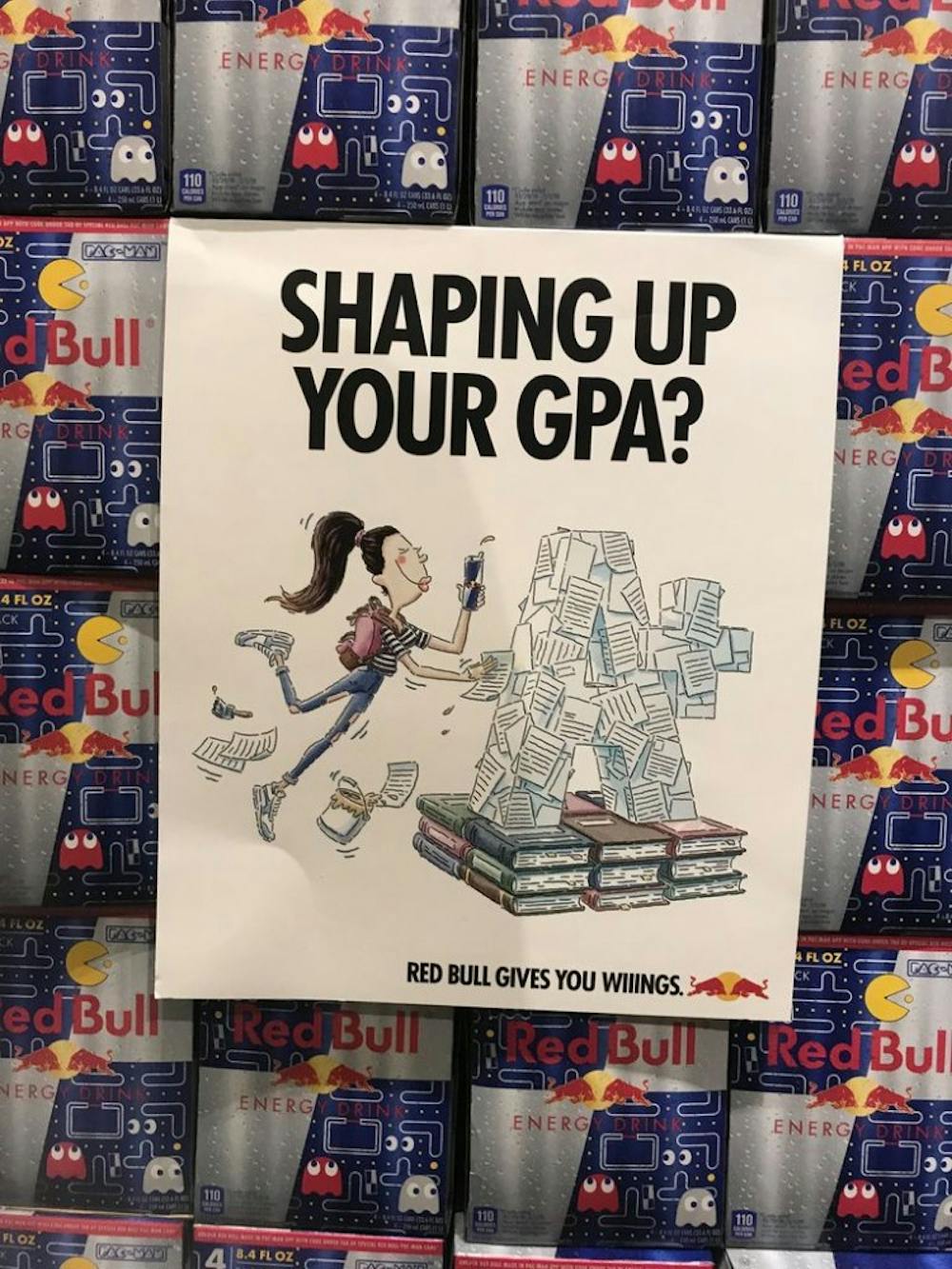Last week, I noticed a giant Red Bull display in the Frist Campus Center C-Store that included the message: “Shaping up your GPA? Red Bull gives you wings.” This statement was accompanied by an image of a student papier-mâchéing essays and tests into the shape of an “A+” while drinking a Red Bull. I was shocked. Although the University claims to be committed to the mental and physical well-being of its students, one of its convenience stores clearly promotes unhealthy habits and unrealistic expectations.
The C-Store is open until extremely late at night. It closes at 3 a.m. on Thursdays and Fridays; all other nights it is open until 2 a.m., except for Saturday nights — when the fewest students are studying. Students are often working late at Frist. Should the University sell Red Bull (in packs of four cans) so late at night — and imply that this unnatural energy source will improve grades?
The research conducted on the possible health risks of energy drinks has been inconclusive. The World Health Organization warns that “increased consumption of energy drinks may pose a danger to public health, especially among young people.” The main reasoning behind this is because of the high level of caffeine and taurine in Red Bull.
The National Health Service cautions that too much caffeine consumption can lead to a variety of health issues, ranging from type two diabetes to negative neurological and cardiovascular system effects. Mayo Clinic also claims that excessive caffeine can increase heart rate, blood pressure, insomnia, and anxiety levels. The long-term effects of taurine have not been adequately studied.
Students should not develop a routine of using Red Bull, or any source of caffeine, in order to get their work done.
Regardless of the health effects of Red Bull, the advertisement in the C-Store is a reflection of a deeply rooted issue at the University: the unrealistic expectations placed on students. The image of a girl gracefully papier-mâchéing dozens of papers on a life-size “A+” that stands on nearly two dozen books promotes unachievable perfection. Students should not feel compelled to buy a pack of four Red Bulls in order to “shape up their GPAs.”
Princeton classes are challenging. The student body comprises bright, talented students; not everyone can get an “A+,” and not everyone should expect to. It is not healthy to place such high expectations on oneself, yet many Princeton students still aim for perfection. While it is hard to eliminate the need for perfection in the minds of individuals, the University should not contribute to this unrealistic expectation.
While this ridiculous advertisement was created by Red Bull and was likely tacked onto the display by the employee who delivered the boxes, no one at the University thought to take it down. Although the administration likely did not think much of this seemingly minuscule advertisement, it serves as an ironic representation of what seems to be expected of Princeton students; an expectation contrary to the University’s ostensible priority of mental and physical health.
Princeton students already exert enough pressure on themselves — we do not need advertisements in University stores adding to our stress. In order to be accepted to Princeton, one must work hard and achieve in high school. University students have extremely high standards for themselves; although I’m in my first year, I have already heard countless conversations between students about essay grades, test scores, and GPAs. Clearly, students are already conscious of their grades — perhaps too conscious. We do not need the University to further push these unhealthy expectations.
Not only should University students not feel the need to consume Red Bull or other caffeinated products in order to succeed academically, but “academic success” should not be equated to “A+’s,” as is portrayed by this advertisement. Learning should be about more than the letter grade that ends up on your transcript.
This superficial view of education is not what the University claims to be about. Princeton’s informal motto is, “Princeton in the nation’s service and the service of humanity.” The University seeks to educate individuals in a holistic manner, creating graduates who will contribute to the greater good of society. Nowhere in Princeton’s motto does it mention creating grade-obsessed students who will sacrifice their physical and mental health for a high GPA. While the University may not have created this advertisement, it should pay closer attention to the messages it displays across its campus.
It is impossible to eradicate Princeton students’ unhealthy habits — such as the use of energy drinks to compensate for sleep deprivation — and unrealistic expectations for perfect grades. These are decisions made by individuals, and often deep-rooted issues that are part of many college cultures. While it would be unreasonable to ask the University to eliminate these problems, the University certainly should not further embed them into the minds of its students.

Katie Goldman is a first-year from Western Springs, Ill. She can be reached at kpg3@princeton.edu.








